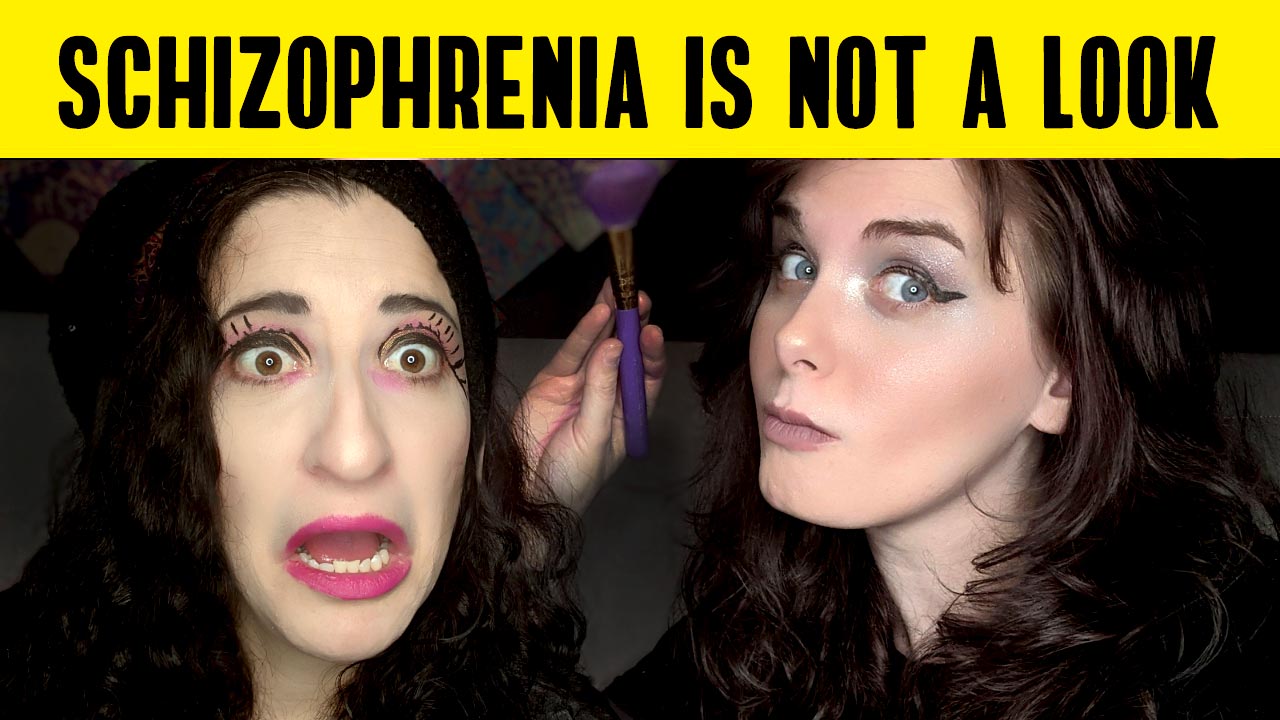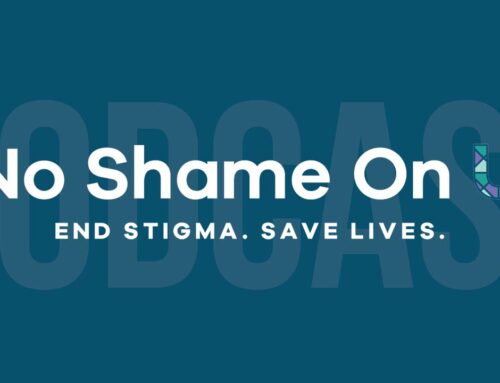Schizophrenia Is Not A Look
In this episode of Schizophrenia and the City, Michelle Hammer and Cecilia McGough put makeup on each other and talk about, well, life. Michelle didn’t put makeup on when she was younger. She was partly insecure not knowing how to put on makeup, and the other part was paranoid that others would see her as a failure if she did try to put on makeup and didn’t do well. In other words, she thought that if she didn’t try, she wouldn’t be judged. This is why confidence is important: not necessarily to achieve some grand ambition, but rather simply to make an effort. Michelle didn’t start putting on makeup until she thought she was starting to look old. In college, Cecilia felt like makeup was a mask; something to hide behind. Now, though, it feels to her more like a method of self-expression. Both were also frustrated that men were not expected to wear makeup – society had no problem if a man was not wearing makeup, but recoiled at the idea of a woman not wearing makeup.
Cecilia has also changed her look drastically. People often tell her that she looks so much better now than when she was younger, but of course that is basically an insult to her younger self. To add insult to injury (or injury to insult, in this case), when she was younger Cecilia was suffering with addiction problems, among other things, making it even harder to think about her past. Michelle, on the other hand, has not changed her appearance much. She did stress about the fact that her hair was curly in an era when all the girls got a Britney Spears haircut, but for that reason she decided later that she would not straighten her hair. She loves it just the way it is.
Cecilia also struggles with her gender identity. She currently feels gender-fluid. She grew up in an environment without boys or sex education, since she had only sisters and was homeschooled. As a result, she was very confused about what it meant to be a “boy” or a “girl.” Michelle also had negative experiences with gender identity. Her brother, with whom she had a strained relationship, would repeatedly call her “Michael,” “gay,” and a “boy,” while at the same time asserting that she couldn’t play sports because she was a girl, resulting in confusion about being athletic (she played lacrosse) and female. Michelle wanted to be a boy, so that she could fit in with all the other boys. It was because she played against her brother sometimes that she was so aggressive when playing lacrosse.
Both Michelle and Cecilia have received the remark that they don’t “look schizophrenic.” What society thinks a schizophrenic “looks like” is a person who can’t work, have a family, graduate college, or live a productive live. When Michelle tells people that she is schizophrenic, they are shocked that she does not fit this profile.
Soon the conversation shifted to talk about dating. Cecilia’s idiosyncrasy is that she always plays with her food whenever she is on a date, and this is due to trauma from an abusive relationship where her boyfriend forced her to count calories to “keep her attractive.” Despite this abuse, she stayed in the relationship because she thought that she was at fault. To this day she suffers from this eating disorder, but, curiously enough, it only really activates when she is around men. Then the paranoia kicks in. Michelle had a “friend” who essentially told her that she was “not feminine enough” to get a boyfriend.
Now, Michelle ignores that “friend’ whenever they contact her. Another bad experience she had was with her coach, who constantly verbally abused her and made fun of her for her schizophrenia symptoms. Michelle could not forgive him either, and (very recently) sent angry, explicit messages to him on Facebook and blocked him, a testament to the fact that a person’s actions many years ago can haunt another person for their entire life.
Schizophrenia And The City
The Podcast
Schizophrenia And The City Hosts
Schizophrenia And The City is a podcast and video series hosted by two New York City women.

Michelle Hammer is a Schizophrenia Activist and spends her time passionately fighting stigma. At 27, Michelle decided to use her artistic talents and fearless personality to do something that could benefit the mental health community. In May 2015, she founded a mental health focused clothing brand. Schizophrenic.NYC is a clothing brand with the mission of reducing stigma by starting conversations about mental health. Michelle has also been featured in many publications such as Mashable, The Daily Mail, Stylist, and Buzzfeed.

Cecilia McGough is a New York City-based mental health activist, writer, media consultant, and radio astronomer. Cecilia also happens to have schizophrenia but does not let her diagnosis define her. Cecilia is the founder and executive director of the nonprofit Students With Psychosis and content creator for the I Am Not A Monster: Schizophrenia project. As a TEDx speaker and Special Books By Special Kids interviewee, Cecilia’s videos have been viewed over 20 million times over multiple platforms across the globe and featured in Forbes, Glamour UK, Barcroft TV, and CBS This Morning national news.





